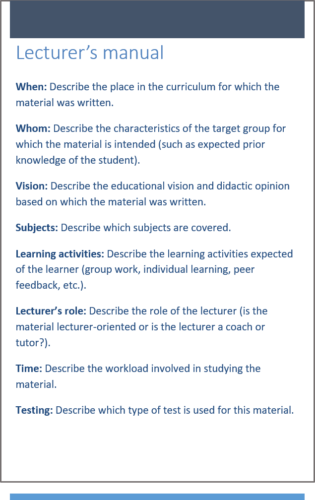Creating course material to share
In the item on course material and copyright we addressed the fact that teaching staff (and sometimes students) create material they want to share with others. Now we address some reasons for sharing and – if you decide to actually share your material – how to actually start doing so.
Reasons for sharing
Lecturers, students, educational institutions and the government all have a different reasons for sharing their educational resources. You can think of making a contribution to society, build a collection of a varied (peer reviewed) material, get inspired, save time and money (mainly for users of the OER), get rewarded for your effort as a creator of material or profiling as an expert.
The SURF SIG on Open Education published an article based on interviews with teaching staff with reasons to work with OER.

Developing learning materials for reuse
If you want to share your learning materials openly, there are aspects to take into account when developing the learning materials. Think of language, audience or level, and format. But also context (or how to make it as neutral as possible for reuse and adaptation), accessibility, didactic information on how to use the resources and of course copyright.
 More on these topics is offered by SURF in the introduction to open educational resources. An example copied from this website is the lecturer’s manual created by Robert Schuwer (see text box).
More on these topics is offered by SURF in the introduction to open educational resources. An example copied from this website is the lecturer’s manual created by Robert Schuwer (see text box).
Storage and metadata; how can the library help?
Once your material has been created, you need to think of where to store it and share it. In the case you are member of a professional community, you might have a platform of your own to do so (e.g. the AnatomyTool platform or Pasemeco; a (Dutch) toolbox filed with material to be used in the context of (education on) palliative care).
Recently, Maastricht University Library has started to explore the possibilities of storing and sharing educational material on edusources. If you are interested in building a collection of (open) educational material your selves, you can turn to us for information and support.
Before actually doing so, you (again) should consider a few things. Use formats others can use and adapt, take care of copyright by using the suitable license, for instance Creative Commons licenses and be aware of updating the resources. Read more information on storing and sharing.
Author: UM Library
![]()
This article is licensed under a Creative Commons Attribution 4.0 International (CC BY 4.0) License.
[et_bloom_inline optin_id=”optin_3″]

Library update
Last updated: 12/07/21

0 Comments